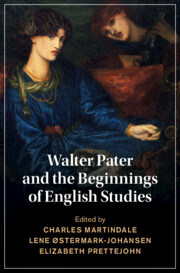Book contents
- Walter Pater and the Beginnings of English Studies
- Cambridge Studies in Nineteenth-Century Literature and Culture
- Walter Pater and the Beginnings of English Studies
- Copyright page
- Contents
- Figures
- Contributors
- Preface
- Abbreviations
- Introduction: Pater and English Literature
- Part I General
- Part II Individual Authors: Early Moderns, Romantics, Contemporaries
- Introduction to Part II
- Chapter 8 Pater’s Shakespeare
- Chapter 9 Pater and the Quaintness of Seventeenth-Century English Prose
- Chapter 10 ‘Spiritual Form’: Walter Pater’s Encounters with William Blake
- Chapter 11 Pater on Coleridge and Wordsworth
- Chapter 12 Walter Pater, Charles Lamb, and ‘the value of reserve’
- Chapter 13 Poetry in Dilution: Pater, Morris, and the Future of English
- Chapter 14 Dante Gabriel Rossetti and His School
- Postscript
- Walter Pater and English Studies: A Select Bibliography
- Index
- Cambridge Studies in Nineteenth-Century Literature and Culture
Introduction to Part II
from Part II - Individual Authors: Early Moderns, Romantics, Contemporaries
Published online by Cambridge University Press: 14 November 2023
- Walter Pater and the Beginnings of English Studies
- Cambridge Studies in Nineteenth-Century Literature and Culture
- Walter Pater and the Beginnings of English Studies
- Copyright page
- Contents
- Figures
- Contributors
- Preface
- Abbreviations
- Introduction: Pater and English Literature
- Part I General
- Part II Individual Authors: Early Moderns, Romantics, Contemporaries
- Introduction to Part II
- Chapter 8 Pater’s Shakespeare
- Chapter 9 Pater and the Quaintness of Seventeenth-Century English Prose
- Chapter 10 ‘Spiritual Form’: Walter Pater’s Encounters with William Blake
- Chapter 11 Pater on Coleridge and Wordsworth
- Chapter 12 Walter Pater, Charles Lamb, and ‘the value of reserve’
- Chapter 13 Poetry in Dilution: Pater, Morris, and the Future of English
- Chapter 14 Dante Gabriel Rossetti and His School
- Postscript
- Walter Pater and English Studies: A Select Bibliography
- Index
- Cambridge Studies in Nineteenth-Century Literature and Culture
Summary
The second part of this book focusses on Pater’s engagement with a number of major English writers. Appreciations covers all post-medieval centuries, excluding only the ‘Augustan’ period about which Pater was rather less than enthusiastic (though he did design, and perhaps complete, an essay on Dr Johnson). Pater is not normally thought of as a leading Shakespearean, but unsurprisingly Shakespeare was central to his idea of English literature, and at one point he may possibly have planned a whole volume on him; he was also at least sympathetic to the idea of undertaking a commentary for schoolboy use on Romeo and Juliet, whose ‘flawless execution’ he commended (‘Measure for Measure’, App., 170). Typically he did not write about the most celebrated plays (his own favourites also included Hamlet), but instead chose for treatment ones less popular in his day: Love’s Labour’s Lost (perhaps because of its reflections on language and style), Measure for Measure (arguably the finest of his three essays, centrally concerned with the way a work of art can profitably engage with ethics), and Richard II (the main focus of ‘Shakespeare’s English Kings’, where Pater contributed to the idea of Richard as the ‘poet-king’ and added to the understanding of the deposition scene). Alex Wong examines all three essays in detail, and comments on the overall value and distinctive character of Pater’s view of Shakespeare.
- Type
- Chapter
- Information
- Walter Pater and the Beginnings of English Studies , pp. 151 - 154Publisher: Cambridge University PressPrint publication year: 2023



